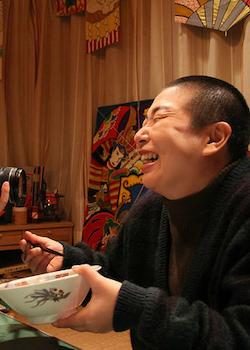Fuku-chan of FukuFuku Flats

Directed by Yosuke Fujita
2014, 110 minutes
UK premiere at the Raindance Film Festival
Review by Mike Sullivan
Yosuke Fujita is a director who was first introduced to British audiences via his first feature film Fine, Totally Fine (全然大丈夫), a 2008 comedy hit. It has become representative of a new kind of quirky Japanese comedy, which in some ways is personified by actor Yoshiyoshi Arakawa, who features in a supporting role in Fuku-chan of FukuFuku Flats. Fujita worked in theatre for a long time before his first movie, and has since followed it up with Saba and Quirky Guys and Gals, films which he both wrote and directed.
Fujita’s latest film, which was again written by him, is Fuku-chan of FukuFuku Flats, which has quite a unique background. There were four production companies involved, one of which was the UK’s Third Window Films – a film distributor famous for bringing the best, and the latest, Asian cinema to our screens. The involvement of Third Window Films along with other international companies means that this film is guaranteed an international distribution once it is released on DVD.
Arakawa, who also starred in Fine, Totally Fine, brings his usual comedic performance to Fuku-Chan…, but full credit has to go to the main star of the film, Miyuki Oshima. For most Japanese people she is famous as a comedian from the Morisanchu trio, but for foreigners she is relatively unknown. Oshima plays the eponymous Fuku-chan, a man in his 30s, and her performance is such that unless you know who she is, you would not know the actor were a woman. During the Raindance Film Festival Fujita was most pleased that many foreigners didn’t realise that she was a woman.
Fujita already had Oshima in mind when he wrote this story, and if she hadn’t agreed to do the movie then he wouldn’t have gone ahead. The making of the film was presaged by a public event in which Oshima – with the help of of Mizukawa and Arakawa – had her head shaved.
The movie itself is a compelling offbeat comedy. We are introduced to Fuku-chan via his interactions with his colleagues and friends, and we can see he is just a nice guy. His best friend attempts to set him on the road to meeting the right woman, but unfortunately Fuku-chan suffers from acute shyness, and comedy ensues. Meanwhile Chiho (Mizukawa) wins an award in photography and is aiming to become a professional photographer. Their lives appear to be completely unrelated but they are brought together as the film develops into a nuanced exposition on childhood bullying and its long-term effects.
At nearly two hours long, the film is sometimes tedious, although the story itself is simply captivating. You can’t help but root for Fuku-chan, laugh at the comedy that ensues from what should be perfectly normal events, and feel genuine sorrow for a traumatic event in his past which has clearly hobbled his future. This movie makes us smile at its moments of silliness, but is undercut by a dark statement about how the carelessness of children can pierce deep into someone’s soul. It is a movie about the sheer joy of a smile, and about atoning for your past mistakes, and the ending leaves us with questions worth thinking about.

